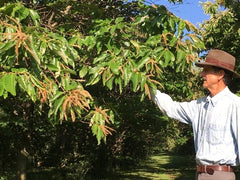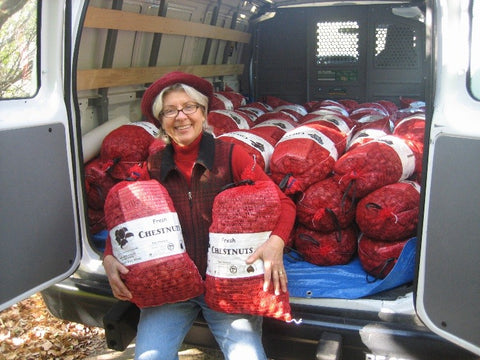If you contact Chestnut Charlie’s, you will be talking to either Charlie NovoGradac or Debbie Milks. Charlie does the horticulture, mostly. Debbie does the business, mostly. We are a married couple. Neither of us are from a farming background but we share a passion for trees, nature, and health food.

In the early 1990s a 20-acre field with Class-1 Kansas River bottom soil came up for sale just north of Lawrence, Kansas. Charlie saw this as an opportunity to start an organic project which would be pesticide free, environmentally healing, healthy, wholesome and sustainable. Chestnuts looked like a promising alternative tree crop, with healthy nutrition, that could be grown organically.
Charlie had read J. Russell Smith, who, in his 1929 book, Tree Crops, a Permanent Agriculture, advocated replacing soil-eroding annual crops with permanent tree crops, including chestnuts. As Smith was writing, the American chestnut, the dominant tree of the eastern U.S., was being wiped out by an introduced fungal blight. Breeding blight resistant hybrid chestnut trees is the restoration mission of the American Chestnut Foundation. (see this Ted talk by our friend, Hill Craddock, link is below) Restoring the wild chestnut forests to North America will not soon be done. But Charlie thought that with farm-grown blight-resistant and hybrid chestnuts we might help restore healthy organic chestnuts to the American dinner table.
Charlie started planting chestnut trees on the 20-acre field in 1995, following organic practices from the beginning. Chestnut Charlie’s has been certified organic since 1998. Being organic is Charlie’s uncompromising condition to farming—that he contribute no synthetic chemicals to the environment. The tree project is surrounded by conventional corn/soybean farms so we planted and maintain a buffer/shelterbelt of mixed tree species around the perimeter boundary. Our tree project now has approximately 1500 nut trees under organic culture within the protective buffer.

Kansas is outside the native range of chestnuts so the orchard is spared some of the usual pests, such as weevils, that infest chestnuts in eastern states. On the other hand, Kansas climate is harsh and the soils are more alkaline--nobody knows which chestnut trees will prosper here in the long run. Charlie tracks our trees grown from different seed sources and different grafted cultivars. Each chestnut tree has an “address” on the farm and a record of source and crop evaluations. Inferior trees and trees that produce bad-tasting chestnuts are removed as we find them, or they are top-worked to better cultivars. Generally, our Chinese species and Chinese hybrid trees prosper the best and produce good chestnuts. We are always on the lookout for that exceptional tree that may become the go-to cultivar for the next generation plantation.
 The Goal of Restoration of Chestnuts in the U.S.
The Goal of Restoration of Chestnuts in the U.S.
Our customers, by their enthusiasm for healthy, American-grown, organic chestnuts, are participating in the restoration of a near-lost food culture. Few Americans remember how prevalent chestnuts once were across the eastern U.S. It is our hope that once again there will be tens of thousands of acres of chestnut trees across our continent saving soil, sequestering carbon, cooling the earth, and feeding our children's children. Thank you, chestnut lovers, for your encouragement.